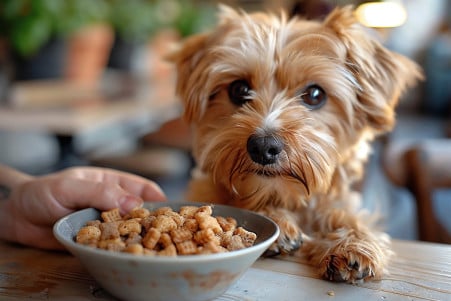Can Dogs Eat Cinnamon Rolls? A Vet-Weighed Warning
22 February 2024 • Updated 20 February 2024

Cinnamon rolls are a delicious-smelling baked good, but can you give your dog a taste? No, dogs cannot have cinnamon rolls. They are full of sugar, fat, and sometimes xylitol, which is poisonous to dogs. Even the dough and cinnamon can lead to an upset stomach. Always make sure to keep these away from your dog.
This article will cover the veterinary and medical perspectives and research-based nutritional information to explain the impact of cinnamon rolls on a dog’s well-being. It will also cover the impact of sugar, sugar substitutes, and other common baking ingredients used in cinnamon rolls. By looking at this information, you will learn why dogs can’t have cinnamon rolls and what other treats you can give them instead.
Can dogs eat cinnamon rolls?
The Dangers of Sugar and Sweeteners in Cinnamon Rolls
While the temptation of a sweet, gooey cinnamon roll is hard to resist, it also poses a danger to dogs. In addition to the potential for other health problems, regular sugar consumption can lead to obesity, diabetes, and pancreatitis in dogs, according to PetMD. The short-term issues may be less severe, but dogs can still experience an upset stomach or metabolic changes after eating the rolls.
Even more worrisome is the presence of xylitol, a sugar substitute that is often used in sugar-free baked goods and is toxic to dogs. According to the American Kennel Club’s Chief Veterinary Officer, Dr. Jerry Klein, xylitol can cause seizures, liver failure, and death in dogs. Signs of xylitol poisoning include vomiting, lethargy, lack of coordination, and seizures, and the consequences can be dire within minutes to hours of consumption.
If a dog eats sugar or sugar substitutes, it’s important to get them to a vet right away, especially if xylitol is involved, according to the FDA.
To avoid these dangers, stick to treats that are made with your dog’s dietary needs in mind, like dog-safe fruits and vegetables, which can satisfy their sweet tooth without putting their health at risk. This way, you can make sure your dog is safe while still giving them the sweet taste they crave.
What Happens When Dogs Eat Cinnamon Rolls?
The digestive and metabolic consequences of dogs eating cinnamon rolls are numerous. For one, while dogs can digest carbohydrates, a high-carb diet can lead to an imbalance in the gut microbiome and inflammation, which can result in the degeneration of tissues and organs, according to Dogs Naturally.
In addition, because these treats are so high in carbohydrates, they can lead to insulin metabolism changes and obesity due to their high caloric content and ability to satisfy a dog’s hunger quickly, only to cause them to become hungrier soon after.
Meanwhile, an article from the Cummings School of Veterinary Medicine at Tufts University notes that dogs don’t need carbohydrates in their diet, but when they are consumed, they are a source of energy that’s similar to protein. However, it’s important to note that there’s a difference between simple sugars and complex carbohydrates, like whole grains, which also provide other nutrients and fiber that can help a dog’s gut.
A study published in PMC even suggests that a better option is a diet of gently cooked human-grade food, which can improve the fecal microbiome and potentially improve overall health, thereby avoiding the problems associated with typical baked goods.
This way, dogs can get the nutrients they need without the negative consequences of high-carb, high-sugar treats like cinnamon rolls. This is something that pet parents should keep in mind when they’re thinking about what to feed their dogs to help support their digestive and metabolic health, especially since a healthy diet is so important to a dog’s long-term health.
Potential Hazards: Baking Ingredients That Are Toxic to Dogs
While you’re baking up a batch of cinnamon rolls, it’s important to remember that there are several common ingredients that can be toxic to dogs.
For example, the American Kennel Club lists chocolate as a potential hazard due to the presence of methylxanthines, which can lead to a range of symptoms from vomiting and diarrhea to seizures and even death.
The ASPCA warns that nuts, particularly macadamia nuts, are dangerous because they can cause weakness, depression, and hyperthermia. Eating yeast dough can lead to the fermentation of the dough in a dog’s stomach, which can result in gas and bloating that can be life-threatening.
In addition to keeping these ingredients out of your dog’s reach, you can also practice dog-safe baking by making sure you’re using dog-friendly recipes. You can also extend this practice to your food storage and preparation areas to make sure that your dog’s inquisitive paws and nose don’t lead them to something that could be harmful.
Keeping a dog-safe kitchen will help ensure that your dog doesn’t accidentally eat something they shouldn’t and will help you create a safe space for them.
It’s also worth noting that cinnamon is not toxic to dogs, but it’s important to know how to safely incorporate it into your dog’s treats, which we’ll cover as we delve into the nuances of dog-friendly diets.
Cinnamon in Moderation: Potential Benefits and Risks for Dogs
While large amounts of cinnamon can be harmful to dogs, there are potential benefits to adding the spice to a dog’s diet in moderation. Cinnamon is high in antioxidants and has anti-inflammatory properties, which can help contribute to a dog’s overall health, according to a study in the Journal of Animal and Veterinary Advances.
However, not all types of cinnamon are created equal. A paper from PMC notes that Ceylon cinnamon, also known as true cinnamon, is the safest for dogs because it contains lower levels of coumarin. Coumarin can be toxic in high doses and can lead to liver damage and blood clotting issues.
This means that moderation is important. If you want to add cinnamon to your homemade dog treats, it’s best to use a small amount of Ceylon cinnamon.
The recommended amount is about 1/8 of a teaspoon for every 15 pounds of your dog’s weight. When you take into account the other ingredients in cinnamon rolls, like sugar and dough, it’s clear that they are not safe for dogs.
Always talk to your vet before adding any new food to your dog’s diet, including cinnamon, to make sure that it’s safe for your dog. This will help ensure that you’re walking the fine line between potential benefits and risks.
Cinnamon Rolls and Dog Health: A Summary
So, while cinnamon rolls may be a tasty treat for humans, they are not a good choice for dogs.
As Hepper explains, the sugar in cinnamon rolls can lead to obesity and other health issues in dogs, and the artificial sweeteners that are often used in these pastries, like xylitol, are toxic to dogs.
The high fat content in cinnamon rolls can also increase the risk of pancreatitis in dogs. In addition, the American Kennel Club warns that cinnamon can cause irritation and sensitization in dogs, especially if it is consumed in large amounts, and that eating raw dough can lead to gastric torsion, a life-threatening condition.
It is important to know and respect the dietary needs of dogs in order to keep them safe and healthy. Sugar, artificial sweeteners, and baking ingredients that are toxic to dogs, such as chocolate and nuts, can all be dangerous, so it is important to keep these foods away from dogs. Instead, dog owners should offer their pets safe, dog-friendly treats and talk to their vet before making any changes to their dog’s diet.
By making sure that we are making the right dietary choices for our dogs, we can make sure that we are keeping them safe and healthy and that the happiness they bring to our lives is not coming at the expense of their well-being.


